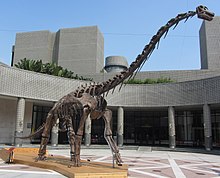| Qiaowanlong Temporal range: late Aptian,
| |
|---|---|

| |
| Restored skeleton | |
| Scientific classification | |
| Domain: | Eukaryota |
| Kingdom: | Animalia |
| Phylum: | Chordata |
| Clade: | Dinosauria |
| Clade: | Saurischia |
| Clade: | †Sauropodomorpha |
| Clade: | †Sauropoda |
| Clade: | †Macronaria |
| Family: | †Euhelopodidae |
| Genus: | †Qiaowanlong You & Li, 2009 |
| Species: | †Q. kangxii
|
| Binomial name | |
| †Qiaowanlong kangxii You & Li, 2009
| |

Qiaowanlong (meaning "Qiaowan dragon") is a genus of sauropod dinosaur. Fossils belonging to the genus were found in 2007 from the Yujinzi Basin of Gansu, China, and were described in 2009 in the Proceedings of the Royal Society B.[1][2] The remains come from a geological formation called the Xiagou Formation in the Xinminpu Group, dating to the Early Cretaceous (late Aptian stage[3]). The only known specimen consists of articulated cervical (neck) vertebrae and a right pelvic girdle, as well as several unidentified bone fragments.[4][5] Qiaowanlong was initially reported as the first brachiosaurid to have been found from China. However, later analysis found that it was more closely related to titanosauriformes like Euhelopus and Erketu.[6] It is estimated to have had a length of around 12 metres (39 ft) and would have weighed around 6 tonnes.[7] The type species is Q. kangxii.
- ^ You, Hai-Lu; Li, Da-Qing (22 November 2009). "The first well-preserved Early Cretaceous brachiosaurid dinosaur in Asia". Proceedings of the Royal Society B: Biological Sciences. 276 (1695): 4077–4082. doi:10.1098/rspb.2009.1278. PMC 2825791. PMID 19734188.
- ^ Burns, Judith (2009-09-02). "US dinosaur had Chinese cousin". BBC News. Retrieved 2009-09-02.
- ^ Xi, Dangpeng; Wan, Xiaoqiao; Li, Guobiao; Li, Gang (2018-09-19). "Cretaceous integrative stratigraphy and timescale of China". Science China Earth Sciences. 62 (1): 256–286. doi:10.1007/s11430-017-9262-y. ISSN 1674-7313. S2CID 135150710.
- ^ Taylor, Mike (6 September 2009). "Bifid Brachiosaurs, Batman!". Sauropod Vertebra Picture of the Week.
- ^ Taylor, Mike (6 September 2009). "More on Qiaowanlong already". Sauropod Vertebra Picture of the Week.
- ^ Ksepka, Daniel T.; Norel, Mark A. (22 October 2010). "The Illusory Evidence for Asian Brachiosauridae: New Material of Erketu ellisoni and a Phylogenetic Reappraisal of Basal Titanosauriformes" (PDF). American Museum Novitates (3700): 1–27. doi:10.1206/3700.2. S2CID 86254470.
- ^ Paul, G.S., 2010, The Princeton Field Guide to Dinosaurs, Princeton University Press p. 204